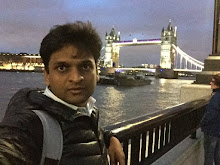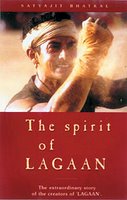
Lagaan is one of my all time favorite movies as I said in one of my recent posts. There is nothing new to say about the movie. It is a proven classic. Ever since I heard about this book called “Spirit of Lagaan”, I was searching for it in every possible way but finally got it through Ebay.com. Satyajit Bhatkal the author of the book is one of the close friends of Aamir Khan who was with him all through the process of making of Lagaan helping him in production works. He also directed a documentary on Making of Lagaan called “Chale Chalo” and won national award for it.
The book may definitely be boring for those who just like the movie. It is for hardest core fans of Lagaan. Also it has nothing to do with the creative process of the movie making. It doesn’t say how the story was written or such a streamlined screenplay is achieved or anything of that sort. It is just about the whole cumbersome process of bringing the Asutosh’s creative genius in paper live on screen and the practical problems they faced for it.
The “Spirit of Lagaan” tells a real story that is more gripping and fascinating than the actual movie. It is all about 1000s of crew and cast of the movie, working hard in every possible way in bringing a dream of a man come true, which of course becomes everyone’s dream later in the process. The book is about dreams, courage, sacrifice, miracle, hard work, determination, optimism, team spirit and above all synergy. He takes us with him for a long journey right from the moment when the seed of Lagaan was sowed in the minds of Asutosh till the movie getting an Oscar nomination. With a high level of observation, he covers almost every important episode of this exciting real life story dated accurately.
The author says that every one involved in Lagaan will have his or her own story to tell but what he registers here is the combined story of all of them together from a different perspective. It is like a superset of all those sub stories, the story that will touch the individual stories of every one involved in the movie making process. The author gives more emphasis on the cultural amalgamation as the movie brings people from various social and cultural backgrounds together. Of course, it really is interesting to know how well they got together to an extent that two of them from the British Cast fell in love and got married in the Champaner village temple set before the entire cast and crew of the movie. And it happened like any other Hindu marriage. It truly reflects the kind of bonding these people had while shooting.
He gives more emphasis on the problems they faced while shooting than the joyous moments. He records everything from thorns in Champaner plains that ached the legs of the cast who have to walk with bare legs (period factor), the extreme heat of the desert to the trouble of production executives in getting 10000 people for first day cricket match shoot in a village that is far away. In the vein, there are lots of interesting trivia about the movie. The final pages of the book is so touching and overwhelming as like the climax of Lagaan. When the book pictures in words about the moment Asutosh got the first feedback call about the movie from her sister from Mumbai, I felt like how I was when for the first time I saw the rain pouring in the climax after they win the match in the movie. The last few pages in my book turned wet as I read through.
Now eagerly waiting for the official DVD release of the movie in India.
12.30.2005
Spirit of Lagaan
Posted by P.S. Suresh Kumar at 12:28 AM 2 comments
12.29.2005
Plagiarism - I am Not Sure.
"Warriors of Heavan and Earth" is the chinese film for which A.R.Rahman wrote a great score fusing indian and western classical elements with traditional chinese music. The album also had an indian release with Hindi version of the Chinese song included.
Oflate, Warriors Of Heaven and Earth tracks are being used in many TV channels. But in this trailer of Kalabha Kadhalan, they have used most of the tracks from this album. But for that i am not sure, how responsible Niru (the music director of the movie) is. We can't say that he has copied from ARR. His Moongil Nila album had genuine and fresh music. I have full faith on him. The marketing people are doing this just to grab the attention of the viewers by giving a grand international sound to the trailers. But the big question is, "Are they doing it with proper rights?".
There are many other examples in recent times, "Vairavan" trailer used "Why?Mr.Anderson" track from Matrix Revolution. For Majaa they used WOHE tracks again. Even for "Kangalal Kaithi Sei" trailer for which A.R.Rahman is the composer, they used a Lord of the Rings soundtrack intially. So, i strongly belive that the composer cannot be blamed for this.
Posted by P.S. Suresh Kumar at 3:52 PM 3 comments
12.28.2005
Missed a Life Time Opportunity

It has always been a dream for me to watch a wstern classical symphony concert live. But when such a life-time opportunity came to Chennai, i missed it for rather silly reasons. Zubin Metha came to chennai to perform three symphonies to raise fund for Tsunami relief measures. It held in Music academy on December 26. Hindu has lot of scoops and image gallery on the concert and also an exclusive interview of Zubin Metha.
Posted by P.S. Suresh Kumar at 3:50 PM 0 comments
In my Must Buy List
Titanic is THE all time favorite movie of mine. Nearly after 7 years of its release a complete special collector’s DVD edition has been released this year with lots and lots of special features. Again, it got released in US and in other major international markets but not yet in India. Eagerly waiting to grab this DVD. Water Album Lagaan DVD 

Actually I have heard the songs of this album online. It has great melodies from A.R. Rahman. Never heard ARR using very less instruments with great emphasis on melody before except for some songs like “En mel vizhundha mazhai thuli” and “Vellai pookal”. It is a must buy for any hardcore ARR fan. I don't know why they haven't released it yet in India.
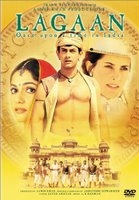
I am really surprised to know that VCD and DVD rights of “Lagaan” are not yet sold for Indian market. Lagaan is also THE all time favorite Indian movie of mine. Don’t know what is the problem in releasing it. Even the DCD of “Mangal Pandey” has got released. I expect a complete package DVD for Lagaan like that of Titanic. I hope they would include national award winning documentary “Chale Chalo – Spirit of Lagaan” along with the movie in the DVD. Also director’s commentary would add some value.
Illayaraja Concert DVD
Recently held Illayaraja Concert in Chennai delighted around 10000 hard-core fans of Illayaraja. Now negotiation is going on between ilayarajafans yahoo groups and Jaya TV to release the whole concert in a DVD. And it seems jaya TV has accepted to give the rights. The DVD will definitely be a great treat for all IR fans.
Posted by P.S. Suresh Kumar at 11:30 AM 0 comments
12.27.2005
King Kong - Raaja Korangu

If you find my translation of the movie title in Tamil is pathetic, then so is the Tamil dialogues in the Tamil version of "King Kong". I have seen both versions. To an extent, it is understandable if the dialogue writer changes the meaning of the original to match with the lip movements but what the writers have done in King Kong cannot be excused.
In the final scene after the King Kong falls down, one of them in the crowd will say "The airplanes killed the beast" and Carl will say " It is not the planes but the beauty killed the beast". The beautiful one liner at the end of the movie goes dumb in its tamil translation.
This is how our guys have written it.
The guy in the crowd says, "Cityoda nimmadhiyayae ithu keduthiduchu"("It has disturbed the peace in the city").
Carl will say," Athu theevula nimmathiya irundhadhu, naan than athoda nimmathiya keduthutaen"("It lived peacefully in the island, it is me who disturbed it peace by bringing it here").
Posted by P.S. Suresh Kumar at 10:48 AM 1 comments
12.26.2005
Angels and Demons

Heard people saying that “Angels and Demons” is the best of Dan Brown but after reading it I would say, “Da Vinci Code” is still the best of his if we consider the amount of action, adventure, entertainment value and the pace of narration in the novel. If we look at the other way around, based on the content and the moral of the novel, “Angels and Demons” has more insight and thorough analysis on the debate between God (Christianity in specific) and Science than any other book. In fact the hardcore philosophical books so far I have read haven’t dealt this topic in the way Dan Brown has perceived it.
The conversations written based on this debate are highly thoughtful and enlightening. Especially, the Camerlango’s speech to the media about victory of science over God is highly diplomatic. It is for this philosophical analysis I like the book so much than for Langdon’s brilliance in finding the path of Illuminati to stop the murder of the cardinals.
Actually there is no much of puzzles and riddles to solve except for a single poem, which they find from one of the books of Galileo. Everything else seems to be tackled by the information either in Langdon’s memory or with the help of somebody else around him. And that is why the way they trace out the path of Illumination by using the directions of the angel in every Bernini’s work is kind of boring. But those boring episodes in between are made up by the tension buildup in the reader’s mind out of curiosity to know how each of the cardinal is going to be assassinated in such an open space.
In DVC, there were more practical and mathematical puzzles and riddles, the complexity of which the readers can easily understand. So when Langdon solve them successfully, we just can’t stop admiring the brilliance of Langdon and in turn the writer. But here that is not the case.
The book is pretty descriptive considering the fact that the whole story happens just in 24 hours. The adventure of Langdon actually starts only after first 200 pages. But there is enough surprise in those 200 pages to keep us involved. The first part was like reading a science fiction novel with lot of technical details about one of the most shocking inventions that a scientist in CERN has done to prove that God and Science meets at a point. Then the second part is full of suspense, thrill, chill, action and adventure by Langdon.
The third part that is the last 150 pages is just brilliant. It is the best part of the novel. Hell a lot of twists and turns, surprises and shocks lay there in those final episodes. The best thing about the novel is that no character can be blamed for whatever has happened, everyone has a valid reason for his or her actions. There are some logical glitches in the novel say for example the real intention of the Hassasin, who actually does all the killing is not explained well. Also the death of Camerlango remains a mystery till the end. I won’t say this as a racy page-turner like DVC, but still it is brilliant.
Posted by P.S. Suresh Kumar at 2:20 PM 1 comments
12.25.2005
Tamil Film Music 2005 - A Round Up
The year 2005 can be called as the year of high expectations (from composers). The reason being most of the movies released in 2005 had successful director and composer combinations those who have delivered either hits or classics in their previous ventures. Fazil + Illayaraja’s Oru Naal Oru Kanavu, Balu Mahendra + Illayaraja’s Athu Oru kanaa Kaalam, Kamal + Illayaraja’s Mumbai Express, Thagar Bachaan + Illayaraja’s Chidambarathil Oru Appasamy, A.R.Rahman + S.J.Surtah’s Aa Aah, Ameer + Yuvan’s Raam, Yuvan + Vishnuvardhan’s Arinthum Ariyamalum, and Vidhyasagar + Lingusamy’s Ji. Another reasons being some new interesting combinations like Shankar + Harris Jeyaraj in Anniyan, Cheran + Sabesh-Murali in Thavamai Thavamirundhu, Rajini + Vidhyasagar in Chandramukhi, Yuvan + Lingusamy in Sandakozhi. But as a whole, composers couldn’t meet the expectation of the audience, though they gave some good songs. It is because their previous efforts were far superior and excellent. So, mere good songs are not enough to accept. We the music lovers were not completely satisfied with the output. Am I right? However there were some great songs.
“Kaatril Varum Geethamae” will definitely be there in the list of Illayaraja’s all time best melodies. It is a healer. The simple yet haunting melody takes us to the heaven directly. “Antha Naal Nyabagam” is vintage IR melody with heavy violin orchestra backing. Though it may not reach the classic status, it is a good song to be remembered. And I can’t forget the beautiful Celtic violin piece in philosophical song “Kaatu vazhi” in Athu Oru Kanaa Kaalam. Mumbai Express – Mind blowing is the word. “Poo poothathu” is here to stay in our mind for decades to come. While listening to this song, don’t fast forward the dialogue part in the start; It has got some beautiful piano melody. The jazzy interludes in other peppy songs, and the symphonic instrumental “Monkey Chatter” are refreshing to listen to. The collaboration of IR and Sivamani almost after 2 decades for this album is pretty evident in the rhythms. Though there is a deja-vu sound, I feel elated when I hear the starting chorus bit of “Kaetkalayoo” from Kasturimaan. To surpass all the complaints that we have on IR’s music in movies, the most ambitious “Thiruvasakam” album got released in 2005. No words can express the beauty and form of the music that IR has given for Thiruvasakam.
Just the name A.R. Rahman is enough to create high expectation both on the movie and the music, no matter with whom he collaborates. A.R. Rahman came back to TFM with a bang. The music of “Aa Aah” was a big hit. “Aarai kodi” is an ideal introduction song that any hero would long for. “Varugirai” is a nice experiment in music sounding the anger and sober at the same time with a unique orchestration that only ARR can set a song to. Hey, next year seems to belong to ARR as we have lot of projects lined up. Jillendru Oru Kadhl Kathai, Puli, God Father, Dasavatharam and above all Sivaji. Don’t worry ARR fans; we all are in for a great treat next year.
As a composer Vidhyasagar, didn’t move even a step ahead in this year. His music for Chandramukhi became popular more for Rajini than his music itself. Though music of Ji is a major let down, “Ding Dong koyil Mani” is typical VS melody. The soothing female humming and veena pieces are beautiful in this song. Then we have Rahmanish “Konja Neram”, IR ish “Athinthom” from Chandramukhi. Both are pleasant to listen to. But the pick of the album is obviously “Raa Raa”. Actually this song takes a lot of inspiration from the songs in Malayalam and Kannada versions of the movie and yet it sounds better with a fresh orchestration. Binny Krishnakumar needs a special mention for her beautiful rendition of the song. Vennila from Ponniyin Selvan and Moolai Thirugum from Kana Kanden, Chi chi from Majaa are other note worthy compositions from him. But on the whole, something is missing in his music this year. Hope he will deliver his best in 2006.
When I heard the theme of Anniyan named “Stranger in Black”, I was totally disappointed with Harris Jeyaraj. It is a blatant copy of “Resurrection” theme from Passion of Christ. Harris for sure has talents but at any cause one cannot accept plagiarism from the composer (same holds for Illayaraja for his “chittu kuruvi” song from Chinna Veedu which is a blatant copy of Dvorak’s symphony). Anyway, let us forget about it. Anniyan has two good semi classical melodies “Ayyangaru veetu” and “Kumari”. I liked even the catchy Remo song. But to me, his melodies in Thotti Jaya were the best of his compositions in 2005. “Uyirae En Uyirae” and “Yaridamum Thondravillai” are soothing compositions from Harris. I like the sax piece in Suttum Vizhi song from Ghajini so much to an extent that its tune lingers in mind more than the actual tune of the song. There are tune of certain songs that you can casually whistle and enjoy, “Oru Maalai Ila veyil” song has got one such. Harris, please stop plagiarism and those horrible noisy western choirs and chants as background scores in movies at least from 2006. Sure he would have something fresh to offer to Gautam’s “Vettaiyadu Vilayadu”. Let us see.
Undoubtedly Yuvan Shankar Raja is the composer of year 2005. He composed music for so many films but managed to come up with wide variety of songs and was also able to strike a balance between IR and ARR and class and mass. His best albums are Raam, Kanda Naal Muthal. These are two complete albums in which I liked all the songs equally. I needn’t press FF button when I play these albums in my player. Even some of his mediocre albums had good melodies. Say “Kadhal Enbadhu” and “Unakku endru” from Oru Kallooriyin Kathai. Another successful album is “Arinthum Ariyamalum” which had lot of inspirations from various music forms. Yet I liked the way Yuvan was able to get “Manmadha Leelaiyai” fit in modern rhythms in “Theepidikka” song. Also I like the whistle tune in “Yela Yela” song very much which is also the main theme of the movie. And surprisingly the songs of Kalvanin Kathali also sound fresh and different. But Yuvan was not consistent. He gave flops like Daas, Sandaikozhi and Oru Kallooriyin kathai. Yuvan keep up the good work and try to be more consistent because that is what TFM is starved of as of now, we have no consistent composers as IR and ARR were before.
Other Composers
There is this beautiful “Muthal Muthal” song by Bharadwaj from Priyasakhi. You cannot stop admiring the ease with which Chitra adds so much of emotion and expression in her voice while singing. D. Imman proves that he too has got some good melodies in his mind. “Kathal Illai” and “Manjal” song from ABCD and “Kathal Enbadhu” from Thaka Thimi Tha are some better compositions of his in 2005. Devi Sri Prasad (an ardent fan of Illayaraja) fills the vacuum created by Deva in TFM. Occasionally he comes up with some good music, though most of them have a Telugu hangover especially his rhythms. I liked “Jo Jo Jyothika” and “Mayaavi” songs from Maayavi. I was expecting a lot from Niru who gave a beautiful private album called Moongil Nila. But his music is “Kalaba Kadhalan” is nowhere near his music in Moongil Nila. Yet, “Chellamae Ithu” song has got good melody and strings backing.
Finally, most surprisingly the best soundtrack of the year is “Thavamai Thavamirundhu” by Sabesh – Murali. The songs gel well with the movie. The songs are refreshing with a variety, catchy tune, melody, just enough orchestration and meaningful lyrics.
Notable Absentees
Karthik Raja and Ramesh Vinayakam are two talented composers whom I feel are under rated and under utilized by our directors. Karthik Raja’s score in Kudaikkul Mazhai was stunning and Ramesh Vinayakam gave some pleasant melodies in Azhagiya Theeyae last year. I wish to hear more of their compositions at least in 2006. Also Joshua Sridhar who gave a hit music in Kaadhal last year wasn’t able to continue with the success due to some personal issues. Heard that now he is composing for a couple of movies. Hope to hear more from him too.
Posted by P.S. Suresh Kumar at 9:59 AM 6 comments
12.24.2005
The Memento
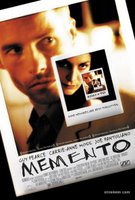
Watch it and test your memory power. I watched it only once and I still have a lot of questions in my mind. But overall, it is great attempt and movie is worth watching at least thrice. The narration keeps our mind busy but forgets to touch our soul. There could have been brief introductory scenes that reveal their love and bondage other than Lenny saying it through words. It would have provided a strong reason for a man in such a condition trying to take revenge. We don’t empathize his conditions. Though it had an admirable screenplay, the one issue I find with the film is that we don’t emotionally relate to Leonard.
Actually, there is another parallel track that moves in a linear fashion shown in black and white, which initially is very confusing but when we later we come to know that this is the link used to end the story, we couldn’t imagine the genius of the screenplay writer.
Of course, may be Christopher Nolan might have thought us to realize a character like Leonard is lot better than normal people for whom a new world begin in every few minutes, through his non linear narration. We go by our belief that what we believe to have happened is what actually happened, we never go by facts. While watching this movie, it is interesting to know, even we who claim to be the normal people, don’t remember what we saw just 15 minutes before. The style of narration made all the difference and tests the memory power of the audience and kindles an interest in them to watch it again and again. Actually, it wouldn’t have been special it if had taken the linear path of narration.
Even though I already know it is going to proceed in backwards, there was lot of confusions. The first shot and the scene of the movie clearly explain us how the movie is going to proceed. The title starts to scroll as and when the movie starts with a shot focusing on a hologram, in which we see a dead man lying down showing his back, slowly the image fades and the hologram goes back into the camera, Lenny recedes back, the bullet goes back to pistol and then we see what actually happened. That starts from the end and reaches the start of the plot at the end. Memento is a psychological thriller that travels back in time.
Okay, Let me not get into the difference between Ghajini and Memento, as it is quite obvious and let me just discuss Memento. Ghajini takes just the character and unusual condition of Lenny and his unique methods to survive in and adds masala necessary for the Tamilians to grasp the idea. It will be degrading the level of acumen with which this movie is crafted to say that Ghajini is inspired by Memento. Thanks to Murugadass and his Ghajini for creating awareness about a movie called “The Memento”.
Posted by P.S. Suresh Kumar at 9:57 AM 6 comments
12.23.2005
In my Must Buy List - Memoirs of Geisha
Ever since I heard this album, I have become a greatest fan of John Williams. As “Memoirs of Geisha” is co-produced by Steven Spielberg, for the most obvious reasons John Williams got the opportunity to score music for this Japanese film. I always wondered how it would sound if JW writes south East Asian music and now I know how it would. Actually I liked his similar work in “Seven Years in Tibet” very much. JW scores mostly include heroic timpani, trumpets, and brass and string section dominating the orchestra. But for this movie, JW has given a dark, quiet, intimate score that beautifully brings out the emotions and also the sound of the place in which the drama is set in. Yo-Yo Ma has played the Solo Cello pieces and Itzhak perlman has played (who played the haunting solo violin pieces in Schindlers' list) violin pieces with other traditional Asian instruments and minimal symphonic string orchestra supporting them aptly. Listen to the 1-minute audio clip of all the tracks here. This is a must buy album for any JW fan. I can’t wait to get hold of this CD but really don’t know whether it would be released in India. Not a surprise to know that this score has been nominated for Golden Globe awards thie year. 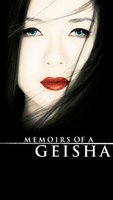
Posted by P.S. Suresh Kumar at 3:50 PM 0 comments
12.19.2005
Speaking of Films - Satyajit Ray
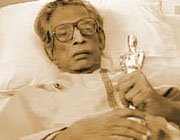
Immediately after watching Pather Panchali, I went to a bookstore and bought Speaking of Films written by Satyajit Ray. It is a collection of essays and articles on various aspects of movies and moviemaking written by Satyajit Ray. This book is published marking the 50th anniversary of release of the classic “Pather Panchali”. Film buffs and aspiring moviemakers may consider this book as a treasure. I haven’t read many books on moviemaking except for “Thiraikathai Yezhuduvadhu Yeppadi (How to Write Screenplay)” by Sujatha.
But reading this book is a totally new experience. It is almost like a textbook on filmmaking. The depth of details that Ray describes about movie making is stunning, revealing and interesting. Ray has great knowledge about world cinema. While reading his comments on Indian cinema and other world cinema, I felt Ray is not just a great filmmaker but also a great (harsh) critic. The extent to which he analyses each and every scene in the movie is a lesson to the professional film critics know, who does nothing except for filling half of the page with the story of the movie and rest to write one line about other very well known aspects of the movie which even a commoner will be able to say. The one basic principle of movie making that Ray keeps repeating on the book is “A Cinema should speak and communicate through visual images and sounds and not through dialogues”. I was really surprised to know how obsessed with western classical music (as I too am) Ray was. At many places, while explaining on movie making techniques he uses western classical music for the analogy and now I know how he himself turned as a composer (and won national award for best music) for his films.
In “My life, My Work”, he talks a lot about how and why he became a movie maker and why “Pather Panchali” is the way it is. He says that he wanted to break all conventions in Bengali cinema. The explanation of first 7 minutes of the movie “Charulatha” is another great part of this article. He explains how those 7 minutes of silent happenings communicates content of so many pages of a novel without even a single conversation or any director’s voice over behind to read about the characters and what they are doing. The interesting part of the next article, “making of a film” comes when he describes the screenplay and various technical aspects of last 5 minutes of “Pather Panchali” in detail.
Language of Cinema: Then and Now (1969) has lot of insight details about language used by various great movie makers and the evolution of new techniques of film making in all parts of the world. The major emphasis here is on the slapstick comedy. And so he talks more about Chaplin and Buster Keaton who were considered the fathers of Slapstick comedy and the techniques they used to make their comedy appealing on screen. “Soviet Cinema” tells about the evolution of cinema in Russia and some of the great works in Russian cinema. I should say this is the article I liked the least because it is just a history of Russian cinema and touches a very little upon the movie making techniques.
The subsequent articles focus largely on Bengali cinema. It is very evident how much Ray hated the theatrical approach in every aspect of movie making followed by Bengali filmmakers. He also tries to strike a balance saying that the pressure of making the movie commercially successful was responsible for less aesthetic movies in Bengali and also adds that with very little exposure about the techniques in movie making, the level of technical expertise that Bengali makers have shown cannot be seen if it were the same condition in any other part of the world. He also gives a rather surprising practical reason for Ray’s reluctance towards making films dealing with urban issue.
The article Background Score in films is an eye-opener. I suggest all the composers must read this article. I thought he would speak more about the symphonic background scores used in Hollywood films but he restricted his article to just about that in Bengali films. I would say this article is the most interesting one (to me) in the book. He talks in length about the evolution of background score in films, when and why it is necessary for a film and how he used it in his own films. He also explains certain norms and principles by which a score has to be written for a film.
Dialogues in films has nothing new to say. He again emphasize on his basic principle that only images should speak in a film and the dialogues should be treated as an alternative for communication. And if it were used, it should be as real as possible.
Colors in films is another interesting article about filmmakers reluctance in using color for serious films those days. He clearly puts forward that such a notion is absolutely wrong. Color is just another visual technique that takes a film close to the reality and it can be used for movies based on serious issues also. He also adds many examples to prove how colors make the job of a filmmaker easier by providing various ways to convey a lot through images. He also criticizes the way the colors were used just for glamour in Hindi films.
All those so-called professional film critics have a great lesson in the article Critics in the eyes of a director. And the next two articles are Ray’s angry take on worst criticisms on his films “Apur Sansar” and “Charulatha” that got published in magazines. Both the reviews had comparisons of the movie with the actual novel from which the screenplay is adapted. He quotes each and every line of those reviews and explains how invalid they were by illustrating it with all necessary details from the novel and the scenes in the movie. Ray has trashed those critics extremely to an extent they might have left the job and ran away out of shame.
Indir Thakran is an article about how much Ray admired the professionalism of this 70 year old actress Chunibala devi who enacted the role of Indir in Pather Panchali. It was indeed great to know about one who gave one of the most realistic performances on Indian screen ever. In “A Quarter of a century” he writes about how much he has evolved as a filmmaker in last twenty-five years and talks about his own favorites scenes from movies of his own. Other articles are nothing to do with cinema. They are about Ray’s unforgettable personal friends.
Now after reading this book, I am on my way to buy “Our Films, Their films”.
Posted by P.S. Suresh Kumar at 1:44 PM 6 comments
12.16.2005
Pudupettai Music Review
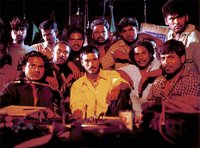
The very first note of the soundtrack starts with a unique flute sound playing a melody (reminds God Father theme, just the sound not the music) and then the same melody is played by a full throttled symphony orchestra which makes it evident that this is not a soundtrack that we usually get to hear in Tamil film music. Also it is evident that Yuvan and Selvaraghavan has strived hard to make this soundtrack unique with a never before heard feel and sound. As they do in Hollywood, this music is more of a soundtrack for the movie, which we will be able to appreciate better after watching the movie. There are 10 tracks, 4 of them are songs, 5 are theme music and one is a remix song.
Now are they really successful in trying something completely different? Well somewhat. For the sake of trying something daringly different, I think they have gone too far, I mean the use of symphony orchestra for movie with such a gangster movie. It sounds too European and
I don’t know how well it is going to fit in the situations in the movie. Also I should say it is quite an amateur attempt from Yuvan’s side. A symphony if not done well may turn into a cacophony. I don’t say that it is too bad. He has got the melodies right but it is the orchestration where he has to learn a lot from his own father and other western classical composers. Here is an evidence of what would happen when a composer, who doesn’t know to write the notes on score sheet of his own compositions, composes a symphony
But yet I should say Yuvan has handled some of the solo Thai instruments deftly in the songs, which adds to the overall uniqueness of the songs. Selling dope is better than other theme tracks in terms of deft orchestration and also has got various moods in it meeting the needs of the situation. Going Thru Emotions: Prelude is a nice fusion of various string instruments, sounds, rhythms, voices and thereby emotions. But I don’t know why I hear the music that I got to hear in advertisements in the between the songs when I hear them in Raaga.com at some places in this song. Night Life is the catchiest of the lot with a flute piece playing a dappanguthu tune accompanied by heavy rhythms. Clash of Titans and Pudupettai Theme are the tracks that are evident of what I said about Yuvan’s orchestration abilities.
The blend of Thai instruments, strings, synthesizers and rocking percussions and electric guitars makes this unconventional number Ithu Enna Kadavulae stand out. Kamal Haasan’s voice is rough and tough in this song and he is just perfect with right expressions. The guitar strumming in the start of Yenga area is nice but it is too situational to grab our attention with just the audio. The rap like singing in Tamil is quite different but there is too much of electric guitar and synth in the song that makes it sound alien. Oru Naalil is the pick of the album. The song is a nice melody with some good philosophical lines penned by Na. Muthukumar. Better Yuvan can stop singing such emotional songs. He is just not perfect in pitch and expression. In spite of Yuvan’s faulty singing, the song works mainly because of the simple rhythm and beautiful guitar and violin pieces performed by Amalraj. Don’t ever try to listen the remix version of this song at all. We should definitely not encourage such songs. It is pure noise. Pul Pesum Poo Pesum starts with a catchy synth piece but soon falls flat as the vocal tune of the song is not so exciting but the interludes and the strings are great in this song.
I don’t know how commercially viable this album is. There are no romantic or peppy dance tunes in it. Anyway in spite of its flaws, I really like this album for its experimentation more than anything else. Let us wait and watch the movie for this soundtrack to grow on us. And also for an extended soundtrack release after the release of the movie as it always happens with Yuvan + Selva movies.
Posted by P.S. Suresh Kumar at 11:31 PM 15 comments
12.14.2005
Sivaji, Pudupet and LOTR
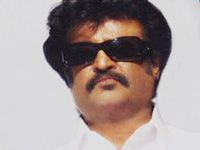
1. Today’s Hindu carries a poster of “Sivaji: The Boss” and it says the shooting starts today. Rajini looks pretty cool in the picture. He wears a blue tuxedo and a cooling glass. His dense hairstyle reminds younger Rajini in early 90’s. But I don’t like that thick mustache much. Sorry guys, I don’t have a scanner to post the picture here.
2. The most eagerly awaited soundtrack of the year (next to Aa Aah), “Pudupet” is releasing tomorrow. The tag line of Pudupet is “The survival of the fittest”. Let us see what this successful (Selva Raghavan + Yuvan + Na.Muthu Kumar) combo is to deliver. The poster also has a promise about the music. It says, “Music that will enlighten your soul from tomorrow”. Considering the subject of the movie, I feel there will be dappanguthu numbers but with a class of their own. Let us see. Also Selva and Yuvan went to Bangkok Symphony orchestra to record the theme music of the movie.
3. There is a short review here on the ‘taste’ of Lord of the Rings the musical that is going to be staged on Feb 2006.
It has few words to say about the music in which our master A.R.Rahman is also involved.
The words written by Shaun McKenna and Warchus, united with the music by A.R. Rahman and Värttinä, stood with enough strength of their own.
Already, it's possible to see how orchestrator Chris Nightingale is creating a unique sound: not folk, not symphony, not show tunes, but an inspired distillation of all three.
Posted by P.S. Suresh Kumar at 12:00 PM 3 comments
12.10.2005
Rang De Basanti Music Review
A.R.Rahman is pretty sure about the kind of response that he wants for his music in Rang De Basanti. He wants it to sell as like any of his albums sold in the start of his career. He is more concerned abut delivering a hit music. But he has done it without compromising the quality or the class. Commercial failures of some of his best works in the recent past seem to have really bothered him a lot. Though the songs of this movie may not be the best of A.R.Rahman, they are energetic, youthful, refreshing and ground breaking. The album is sure to become a chartbuster. Also as like any of A.R.Rahman songs, these songs take little time to grow but once it do, you will not stop listening to it. The album has got 10 songs. Lyrics are penned by Prasoon Joshi.
Ik Onkaar by Harshdeep Kaur is a devotional number. Don’t know whether it is tuned by A.R.Rahman. Lets us switch to next number
Rang De Basanti (Daler Mehndi, Chitra)
At last we have a Punjabi number which doesn’t have a deja-vu sound. With all the usual elements of bhangra music intact, Rahman adds his unique elements which make the song more spicy, energetic and refreshing to listen to. The unique elements are the melodious guitar that joins Daler Mehndi whenever he starts with “Thodi se dhool meri”, the additional percussions that adds a punch to the looping bhangra beats, innocent vocals of Chitra which turns the number a little soothing in the middle and above all the Mandolin that plays the “diggu diggu” tune. This song is destined to be a hit at the time of its birth itself. Ever since I saw the promos playing this song, the funny “diggu diggu” was lingering in my mind. It gives a whole new flavor to the song. Daler Mehndi does a great job as the song belongs to a genre that in his genes.
Paathshala (Naresh Iyer, Mohammed Aslam)
It is a ground breaking song all the way. The pumping beats along with electric guitar captivate us the very moment it reaches our ear drums. I think this kind of lyrics, mixing Hindi and English words is pretty new for bollywood music as far as I know. This is already there is Tamil film music. Prasoon Joshi has done a good job here. Listen to the acoustic guitar pieces that come and go out the song in the middle, another Rahmanish element that gives a new sound to the song. There is also another version of the song which has got English Rap bits by Blaaze in addition to the original version. This version is again very catchy with more synth stuff and additional beats. The sweet guitar piece that I mentioned in the original version gets a slot in this version to sound alone without any voiceover. Get ready to lose your control while listening to this song.
Tu bin bataye (Madhusree, Naresh Iyer)
This is the only romantic melody in the album. I think this is just an average melody which gets elevated by the beautiful orchestration. The string section conducted by Sirnivasa murthy is just brilliant in this song. Also the choir backing Naresh’s vocals in the later part of the song is beautiful. The strings and choir carry lots of necessary emotions with it. Madhusree sounds sweet as honey. Naresh Iyer has a soothing voice and we can expect him on more melodies like this in days to come. It somehow reminded me a Tamil song of A.R.Rahman.
Khalbali (A.R.Rahman, Aslam, Nacim)
Those who follow Rahman’s music from the beginning will definitely know about his special fascination towards Arabian music and that comes to fore yet again in this song. It is a very unconventional number rich in Arabic flavor. When Rahman’s different style of singing with an Arabic accent, Arabic lines by nacim sandwiched in between, the Arabic percussions by Hozam Ramzy (who collaborated with A.R.Rahman before for Meenaxi), the middle-eastern strings, and synth bass are mixed together, it evolves as a new sound which we get to hear in this song. This song needs at least ten times of listening to get used to the unusual format and sound of the song. It is another great number in the album.
Khoon chala (Mohit Chauhan)
It is a beautiful song with a nice melody and great orchestration. The beautiful piano notes, the strings, the haunting Cello piece together impose a haunting effect on the listeners. The orchestration and beats backing the final crescendo are brilliant. Mohit chauhan’s quite unique vocals are soothing and expressive enough.
Luka Chuppi (Lata Mangeshkar, A.R.Rahman)
The guitar strumming all through the song is similar to that of “Chanda Sooraj” song from “Vande mataram” album. But the resemblance makes no harm to the beautiful melody in this song. Instead it aptly aids the melody. Rahman used Lata’s refined voice by restricting her not to go high and nasal. Rahman has also done a neat job especially swara alap at the end is great. I liked Vibraphone usage in this song which I feel has a sound that could make listener easily relate to kind of emotion that this song celebrates. There are lots of surprising deviations in the form of orchestration and rhythm as the song proceeds. The much talked about Maa-betta song doesn’t disappoint.
Lalkaar
It is kind of a poem recited by Aamir Khan widely misunderstood as sung by Aamir Khan. We will be able to know more about this song with the visuals. It has got additional bass section, distant vocal humming and chorus running in the background creating a strange aura.
Roobaro (Naresh Iyer, A.R.Rahman)
Yet another song that starts with a speedy casual guitar strumming. I don’t know how to categorize this song. It is very peppy and captivating. “Roobaro Roshini” is where Rahman’s peeps into the song in between and it sound like high-pitch “Anjaana” bit from Yuva. The song has catchy jazzy beats and strange backing vocals. This song turns addictive on second listening.
Highlights of the album
First of all, this is an A.R.Rahman album without Naveen’s flute. I don’t remember any album of A.R.Rahman without Naveen’s contribution.
A.R.Rahman avoided the usual Udit, Sonu, Alka and others in the album paving way for new singers to exhibit their talents.
The variety in the songs. No two songs sound same in this album. Of course this is true for most of ARR’s albums.
Naresh Iyer seems to the latest favorite of A.R.Rahman. He has got 3 songs in such a big film and that is definitely a great debut for any new singer. Naresh Iyer does a great job in all three songs which are completely different from each other.
At last, an album which even common bollywood music lovers will like and that will make the album a big success commercially.
Posted by P.S. Suresh Kumar at 4:08 PM 10 comments
12.08.2005
Other Side of Me - Sidney Sheldon
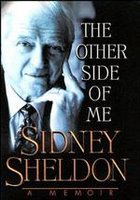
Have heard a lot about Sidney Sheldon but never read his works. I was eagerly waiting to buy his next release. Then accidentally saw this book Other Side of Me in a bookstore and without even reading the synopsis on the back cover of the book, I bought the book thinking that it is an entertaining thriller like most of his previous works.
I was little disappointed initially to know that it is not a novel but just his autobiography. After knowing the content of the book, thought that immediately flashed my mind was when a writer runs out of ideas, the next best thing he would do is write his own biography (as I was aware that Sidney’s last book was not at par). But Sidney’s narration and its pace changed my opinion on the book.
As Sidney author himself quotes, life is a novel with suspense. You never know what would happen before turning the next page. Though this book is an autobiography, it takes us in a roller coaster journey through the life of Sidney Sheldon that is full of ups and downs, twists and turns, adventure, suspense, thrills and surprises. You never know what will happen next.
Never knew that an autobiography can be written in such an entertaining way. It is because Sidney seems to know what and what not to write rather than how and how not to write to make the book entertaining. He just skips all unnecessary episodes of his life. As we all know, the highlights of a test match with are more entraining than the match itself. Sidney has opted to just register highlights of his life but without loosing the thrill that is attached to the last ten overs of a one-day match.
I wonder how these writers remember all that happened in their life half a century before. Or may they would have maintained a diary, which helps them while writing the book. I admire Sidney a lot for his diverse talents, determination, self-confidence, optimism and hard work. It is rather surprising to know how fate changed his name. In every turn of a page, I was eager to know what made him to go for writing a novel. Of course, it is disclosed almost at the end of the novel and you have just 10 pages to turn after he becomes a novel writer.
The book mostly concentrates on his public life than the personal life after few initial episodes. Yet, death of his second daughter and its consequences are emotionally moving parts of the novel. My only concern about the book is that, it could have had more novel writing experiences of Sidney. Also there are too many names and personalities (of course it is necessary as Sidney had been in show business for most part of his life), one who know Hollywood in early 20th century would better enjoy the novel than others.
Now i will start to read Sheldon's work starting from "The Naked Face"...
Posted by P.S. Suresh Kumar at 12:09 AM 0 comments
12.06.2005
Rang De Basanti Music Releases

The year 2005 has been great for A.R.Rahman and his also his hardcore fans. Though his albums were not selling like hot cakes as any other run-of-mill stuffs do in bollywood music, A.R.Rahman was able to open up new horizons in music with each and every album. The albums that got released this year are Bose: The Forgotten Hero, Mangal Pandey, Kisna and Aa Aah (Tamil). All the albums are critically accalimed but failed commercially except the Tamil one. Water and Rang De Basanti are yet to be released. Water is expected to release on December 13. But the happy news here is that "Rang De Basanti" album release date is comfirmed. It is on 11 December. If both these albums are going to be released in the same week. A.R.Rahman fans or even any good music lover are in for a great treat. I wish at least this time, Rahman's work get noticed by even common people and the album should become commercially successful.
Posted by P.S. Suresh Kumar at 10:59 PM 10 comments
12.04.2005
Thavamai Thavamirunthu Review

Cheran is back with a bang after Autograph. Cheran has identified his strength and used that to a maximum in Thavamai Thavamairunthu. Like Autograph, this story takes us in a trip down the memory lane but this time the theme is different. The theme that is hardly touched upon by the Tamil filmmakers before. It is about an ideal father. So far we have seen only stories that celebrated the greatness of mother but now Cheran throws a bright light on the sacrifices and struggles that every father faces in his life for their prodigies to come up in life. The father figure is portrayed like a god. It is shown effectively in such a way that when we go back to home, everyone (at least I do) will look at their father differently and treat him with more respect. And this I feel is the major success of the film.
Almost every frame of the movie shows the homework that Cheran has done on the script. The story is simple and straight. There are no major twists and turns. The movie is 3.20 hours long but it was not at all boring except for few moments in the second half. The two songs in the second half, “Oru muraithan” and theme music are stretched too long. Especially the theme music used in the montage while showing that family lives happily after all the problems. But there are just too may clips which makes it boring after a point and same is the case with “Oru muraithan” song which is used while showing the struggle of the lovers after they run away from home.
Without any compromise, Cheran has taken sufficient enough (little longer) time to unfold every single scene and that tests the patience of the audience a little. Yet I feel the movie will go down well with all type of audience. We all would have heard or seen such stories in our day-to-day life. But the way it has been transferred to celluloid is what that is laudable. Though it is a well-known story, it is great to see that there are no clichés in the screenplay. There are lots of touching moments and dialogues in the movie. One is sure to shed tears many a times while watching the movie. People may call it melodrama but I don’t find any fault in it if it can take the audience close to those illusionary images and make them empathize with the characters. Actually Cheran has tried to maintain subtlety in emotions of characters in most of the scenes and to be as real and natural as possible in every aspect of the film.
Rajkiran in the father character is the heart and soul of the movie. He has given an extra ordinary performance (May get a national Award) and may be his best in the career. Just look at his face expression and body language when he comes to know that his son was arrested for seeking a prostitute. Cheran has improved his acting skills. I didn’t like his performance in Autograph. Padma priya looks cute and fits to T for the role. Saranya has got some one-liners and she too has done a commendable job. The casting is perfect for all supporting roles are perfect especially the lady chosen for first daughter-in-law of Rajkiran role is perfect for that role.
Technically the movie is at par. Cinematography by M.S. Prabhu is true to life. For a change, he has shot the flash back scenes in color and present period in black and white. I thought that when the screenplay that travels between past and present meets at a point, the color scheme will transfer but that didn’t happen. It is okay, that was just my idea. Songs by Sabesh –Murali are good gels well with the movie. They have done a fairly good job in Background score too. The main theme cue is very good and that is being used all through the movie exhibiting various emotions through different orchestrations. I don’t whether this movie will be as successful as Autograph. But according to me, this movie is better than Autograph.
Though Bhagvad Gita is just a conversation between Krishna and Arjuna; it had something to say to all. While reading it, you feel like it is being told to you. Similarly, this movie has something to say to all of us. The highlight of the movie is that it drives the point home without being preachy. The movie teaches a lesson to the parents, the adult children and the society about the values of culture and family tradition. It tells how a father should grow his child and also how a son should take care of his parents in their final days.
Posted by P.S. Suresh Kumar at 7:27 PM 3 comments
12.03.2005
Asian Mozart to Score for Mozart Film

The Asian Mozart (I never liked this tag of A.R.Rahman linking him with Mozart) is going to compose a part of the soundtrack for a film made on one of the greatest western classical composer, Mozart. Don't assume that A.R.Rahman is going to compose western classical symphonies in Mozart way, he is just going to do what he has been doing in Indian films as the script of the movie demands indian music also. Read more about this here
Posted by P.S. Suresh Kumar at 10:12 AM 1 comments
Kamal's Hunt in Newyork
 Here is an scoop on Kamal's Vettaiyadu Vilayadu. It does sound interesting.
Here is an scoop on Kamal's Vettaiyadu Vilayadu. It does sound interesting.
Posted by P.S. Suresh Kumar at 10:09 AM 0 comments
12.01.2005
Akale Album
I am happy that my first try to listen to Malayalam music album turned out be a pleasant experience. Yes, Akale is the first Malayalam album that I bought and it has got beautiful soul stirring melodies. The composer is M.Jayahandran about whom I have heard a lot before but misunderstood him as the singer with the same name who has sung some immortal melodies in Tamil like "En Mel Vizhundha Mazhai thuli", "Rasathi unna kaanadha nenju", "Oru theivam thantha poovae" and many more. As I said, all the songs are melodious and there is a variety in the album. The composer has tried a fusion of pure western classical and Indian classical music with one form of music not disturbing the other. These songs are perfect for listening in loneliness especially at night. The simple and elegant orchestration with just enough instruments gives a touch of class to all the songs. Every single solo instrument piece is composed with care and each carries a feel and emotion of its own. You have every indispensable instrument for a melody in the songs of this album like flute, solo violin, strings, piano, sax, sarangi, sitar, soft guitar and what not. Most of the songs don't even have a percussion rhythm running in the background. Just the backing orchestration carries the song all through which makes the listening experience a scintillating journey through various moods and emotions. The songs ranges from slow to too slow and one really need patience to enjoy the songs completely. If you really have that patience, the listening experience is nothing short of bliss. Other than the composition, the highlight of the album is the choice of singers. You have lots and lots of talented (both new and old) singers featuring in the songs of this album. I always have a feeling that Mallu's have got most and most number of soothing vocals in India. The healing freshness of the greeneries in kerala reflects in the voice of malayali's too. The divine vocal of Chitra makes the title song more soothing to listen. Karthik is not far behind, he also has got a soothing vocal which most of the Tamil composers are yet to explore in him. I was surprised by the rendition of Ganga (has sung "Nizhal Santhyae"), who has been in A.R.Rahman's chorus group for almost a decade. She has got a great voice and talent. Wonder why ARR didn't gave an opportunity for her to sing in his composition. Chinmayi is one of the most talented singer right now in south India and only one who has the caliber to compete with Shreya Ghosal. Her strong classical base is evident in her songs. "Ravugal" song sung by Chinamyi can't get any better rendition. Sujatha is at her best in "Janavariyil" song. Not just the name, the mesmerizing vocal of P. Jayachandran and M.Jayachandran sounds same. Strongly rhythm based "Pranayae" get its melodious counter part with the vocals of M.G. Sree kumar. Though they are equally good in rendition Vidha Prathap, G. Venugopal and Preetha Prasad are to be heard more to find uniqueness in their voice. The only minor issue with the album is that the blatant copy of some of the popular western classical pieces in the songs. The "Akale" song has got a strings piece in the background that is for sure a straight rip-off from a symphony which I have heard before but forgot the name. And we have a note-to-note copy of Beethoven's Fur Elise in the song "Janavariyil". A talented composer like M.Jayachandran could have avoided this for sure. May be he would have done this desperately but should have given some space in the credits to the original western classical composers. Anyway, this album is a must buy for any good music lover.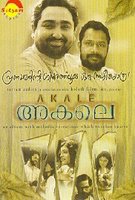
Posted by P.S. Suresh Kumar at 10:15 PM 1 comments


